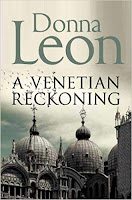24. Donna Leon, A Venetian Reckoning (1995) (4/29/21)
This is the fourth book (of thirty!) in Donna Leon's Commissario Guido Brunetti series, set in beautiful, moody Venice. (I read a British version; in the States, it's called Death and Judgment.) The story begins with a truck crash, then moves into a murder, and then another murder—that quickly gets whitewashed into a suicide. Prostitution figures in, and success: the two deaths, followed by a third, feature an international lawyer and a couple of high-profile accountants. The action takes us back and forth between Venice and the university town of Padua, a mere half-hour train ride away. We learn about in-house tensions at the police headquarters, or questore. And as always with Commissario Brunetti, we get to salivate at some scrumptious-sounding food:He brought his attention back to the table and their plate of fettuccine, glistening with the sheen of butter. The [restaurant] owner came back, carrying a small truffle on a white plate in one hand, a metal grater in the other. He bent over della Corte's plate and shaved at the truffle, rose, and bent over Brunetti's plate and did the same. The woody, musty odour wafted up from the still-steaming fettuccine, enveloping not only the three men, but the entire area around them. Brunetti twirled the first forkful and began to eat, giving in whole-heartedly to the sensual delight of the butter, the perfectly cooked noodles, and the savoury, heady taste of the truffles. . . . They said little until the meal was finished, the duck almost as good as the truffles—for Brunetti, nothing was as good as truffles—and they sat with small glasses of calvados in front of them.
I would have to agree about truffles.
As for the mystery, this one ends up being very dark (according to one GoodReads review, it is the darkest in the entire series), involving not just sex trafficking but a more sordid side of sexploitation. When justice is served, in the form of murders, one nods in agreement: such crimes deserve punishment, yet such criminals are rarely caught out. The finale of the book occurs in a whirl, with justice of a different sort interrupted, the hand of corruption in evidence. I know that's cryptic, but I don't want to spoil the book. Phone records play a key role.
Here's a humorous passage that takes place in the police station. The Signorina is the secretary of the Vice-Questore; she pays a lot of attention (well placed) to her appearance and seems to know people all over town and in all walks of life—people that aid the investigation in all manner of ways.
Brunetti went up the steps towards his office. Before he got to the top of the steps, however, he met Signora Elettra, emerging from the end of the corridor and turning down the steps towards him. 'Oh, there you are, commissario. The Vice-Questore has been asking for you.' Brunetti stopped and gazed up at her as she descended the steps towards him. A long saffron scarf, as light as gossamer, trailed behind her, borne aloft at the level of her shoulders by the streams of hot air that flowed up the staircase. If the Nike of Samothrace had stepped from her pedestal, regained her head, and begun to descend the steps of the Louvre, she would have looked much like this.
'Um?' Brunetti said as she reached him
'The Vice-Questore, sir. He said he'd like very much to speak to you.'
'Like very much to,' Brunetti found himself repeating, impressed by the phrasing of the message. Paola [his wife, a professor of English literature] often joked about a Dickens character who predicted the arrival of bad things by announcing that the wind was coming from a certain quarter, Brunetti could never remember which character, or which quarter, but he did know that, when Patta 'would like' to talk to him, the wind could be said to be coming from that same quarter.
'Is he in his office?' Brunetti asked, turning and going back down the stairs beside the young woman.
'Yes, he is, and he's spent much of the morning on the phone.' This, too, was often a sign of a looming storm.
As always, I enjoyed getting to wander through the streets of Venice with the earnest Commissario, spend time with his wife and daughter, and meet a few interesting characters, some good, some not so good. I will look forward to the fifth book in the series.


No comments:
Post a Comment